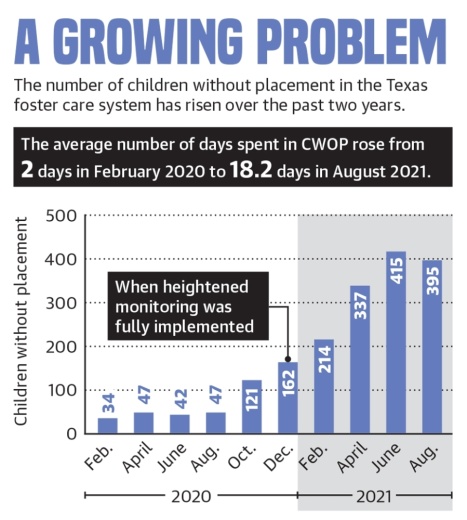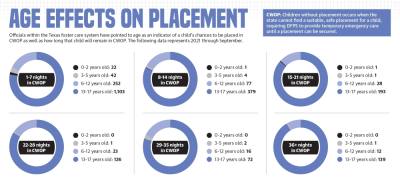According to DFPS officials, individuals in the state’s foster care system receive a “child without placement” designation, or CWOP, when the state cannot find a suitable and safe placement for that child, requiring the DFPS to provide temporary emergency care until a placement can be secured.
Over the last two years, the state has increasingly relied on placing children in unlicensed placements—often motels or office buildings—overseen by caseworkers. In October 2019, 32 children were in such placements statewide, according to DFPS data. In August 2021, that number had risen to 395 children.
Ann Marie Ronsman, executive director for CASA Child Advocates of Montgomery County, said placement in CWOP exacerbates an already stressful situation for children entering the foster care system.
“Being removed from your home is one of the most traumatic things that a child can endure and then going the next step and being a child without placement is even more traumatic,” Ronsman said. “The foster care system is very stressed, and while it is always stressed, it is under an enormous amount of stress at this time with limited resources.”
In Harris County, CWOP numbers have also trended upward over the last year, although the total number per month has remained much lower than statewide averages. In September 2020, two of the 1,635 children receiving DFPS services were placed in CWOP. By September of this year, eight of the 1,415 children receiving services had been placed in CWOP.
DFPS officials and representatives from other entities within the state’s foster care system have attributed the increase to challenges associated with the ongoing coronavirus pandemic as well as caseworker turnover and recently enforced regulations that were mandated after the state lost a federal lawsuit in 2015.
Extenuating circumstances
In an August CWOP report, DFPS officials said the number of children in CWOP had risen in part because of heightened monitoring regulations mandated after U.S. District Judge Janis Graham Jack ruled in 2015 that foster children in Texas “almost uniformly leave state custody more damaged than when they entered.”
According to the report, heightened monitoring is implemented when certain entities within the foster care system have had a high enough rate of standard and contract violations to deem them unsafe and unsuitable placement for children.
Entities placed under heightened monitoring are given a remedial plan by court monitors to address deficiencies and are subject to weekly unannounced visits to ensure compliance. Operations that fail to address the issues within a year can have their licenses revoked, placements suspended, contracts terminated or can incur fines.
Since January 2020, 21 general residential operations—facilities housing 13 or more children—have been shut down or had their licenses revoked statewide, resulting in the loss of roughly 1,200 beds, according to a court monitor update issued in September. Moreover, several entities facing heightened monitoring voluntarily closed during that time, resulting in the additional loss of 375 beds and 157 verified foster homes.
Pat Johnson—kinship program director at Angel Reach, a Montgomery County nonprofit that helps youth in the foster care system transition to adulthood—said she was not surprised to see children in CWOP rise as placement options decline.
“When you have a facility like a group home or a residential treatment center close their doors, if you have not planned for where those youth are going to go, they end up in the office waiting on a placement,” Johnson said. “For every home that closed, you almost need two more to open.”
According to Rebecca Mercer, regional director of statewide adoption agency Lonestar Social Services, heightened monitoring has also led to some foster parents removing themselves from the system altogether.
“It’s forced us to enforce stricter rules on our foster parents, and they have definitely felt the heat from that, which, in turn, turns foster parents away because it’s just too stressful,” she said.
Still, Mercer said she understood why the restrictions were needed.
“We’re trying to weed out those parents who may not have the best interests for the child because there are some out there,” Mercer said.
Additionally, Mercer said difficulties arising from the pandemic have made finding suitable placements for children more difficult.
“We’ve had a lot of foster parents that will come to us and say, ‘Until COVID[-19] is over, we’re not interested in taking placements anymore because it’s just too much,’” she said.
Searching for solutions
In a September CWOP report, DFPS Commissioner Jaime Masters said many providers have cited heightened monitoring as a reason for declining a placement, although she noted that did not indicate the department’s disapproval of the mandate. Masters said caseworker turnover has also contributed to the growing CWOP numbers.
Between February and July 2021, the DFPS hired 319 conservatorship caseworkers. In that same time period, 309 caseworkers terminated their employment. According to caseworker exit surveys submitted in 2021, 86% cited work-related stress as a reason for terminating their employment, up from 40% in 2020.
Despite additional staff members, Masters said the average number of hours each employee spent supervising children in CWOP increased from 22.5 hours in December 2020 to 35.7 hours in July 2021.
In Harris County, the number of children receiving services through the DFPS rose by 141 from 2019 to 2020, while at the same time the number of Child Protective Services staff members fell by 14, according to DFPS data.
In October, Texas Gov. Greg Abbott approved the creation of a new expert panel to analyze the rising number of foster care children in CWOP. The three-person panel will issue recommendations to the governor’s office by mid-December.
Ronsman, who is also co-chair of a Montgomery County task force aimed at improving the local foster care system, said organizations such as CASA can provide needed assistance to youth in the system and the workers who oversee them.
“Many times our volunteer is the only constant in the child’s life,” she said.
Tammy Hetmaniak, executive director of Harris County nonprofit Be a Resource, or BEAR, for CPS Kids, stressed the importance of donating items such as clothing and food as the number of children in CWOP rises.
“It’s important that we can make them as stable as we possibly can, so when our contacts with the DFPS ask us for a resource for these children, we work to make sure that happens,” Hetmaniak said.
Chandler France contributed to this report.







